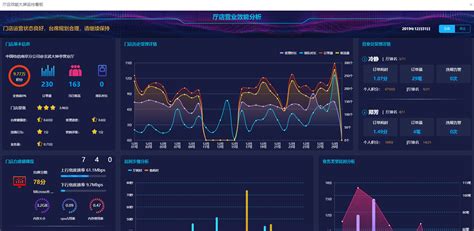大数据处理主要有哪些
Title: Big Data Processing: A Comprehensive Overview
Big data processing refers to the management and analysis of large and complex datasets that traditional data processing applications are unable to handle efficiently. In the digital age, where data is generated at an unprecedented rate from various sources such as social media, sensors, and transactions, the ability to process, analyze, and derive insights from big data has become crucial for businesses and organizations across industries.
1. Understanding Big Data:
Big data is characterized by the three Vs: Volume, Velocity, and Variety.
Volume
: Refers to the vast amount of data generated continuously from various sources.
Velocity
: Indicates the speed at which data is generated and must be processed to derive timely insights.
Variety
: Encompasses the diverse types and formats of data, including structured, semistructured, and unstructured data.2. Challenges in Big Data Processing:
Processing big data poses several challenges, including:
Scalability
: Traditional data processing systems struggle to scale and handle the massive volume of data.
Complexity
: Big data often comes in diverse formats, requiring complex processing techniques.
Speed
: Realtime processing of data is essential for certain applications, demanding highspeed processing capabilities.
Privacy and Security
: Managing sensitive data and ensuring its security is a significant concern.
Cost
: Building and maintaining infrastructure capable of handling big data can be expensive.3. Technologies for Big Data Processing:
Several technologies and frameworks have emerged to address the challenges of big data processing:
Apache Hadoop
: A widely used opensource framework for distributed storage and processing of big data across clusters of computers.
Apache Spark
: Known for its speed and ease of use, Spark facilitates inmemory processing and supports various programming languages.
Apache Flink
: An opensource stream processing framework for realtime analytics and eventdriven applications.
Apache Kafka
: A distributed streaming platform that facilitates the building of realtime data pipelines and streaming applications.
Hadoop Distributed File System (HDFS)
: Provides a distributed file system that enables highthroughput access to application data.4. Data Processing Workflow:
A typical big data processing workflow involves several stages:
Data Ingestion
: Capturing and collecting data from various sources.
Data Storage
: Storing the ingested data in a distributed file system or database.
Data Processing
: Analyzing and processing the stored data using distributed computing frameworks.
Data Analysis
: Deriving insights and knowledge from the processed data using algorithms and analytics tools.
Data Visualization
: Presenting the insights gained from data analysis in a comprehensible format through visualization techniques.5. Best Practices for Big Data Processing:
To effectively process big data, organizations should consider the following best practices:

Define Clear Objectives
: Clearly define the objectives and goals of the big data processing initiative.
Choose the Right Technology
: Select the appropriate technology and framework based on the specific requirements of the project.
Ensure Data Quality
: Implement data quality checks and validation processes to ensure the accuracy and reliability of the data.
Scale Infrastructure
: Build scalable infrastructure that can accommodate the growing volume and velocity of data.
Implement Security Measures
: Implement robust security measures to protect sensitive data from unauthorized access and breaches.
Continuous Monitoring and Optimization
: Monitor the performance of the big data processing system regularly and optimize processes for efficiency.Conclusion:
Big data processing is essential for organizations to extract valuable insights and gain a competitive edge in today's datadriven world. By leveraging advanced technologies and following best practices, organizations can effectively manage, analyze, and derive actionable insights from big data, leading to improved decisionmaking and business outcomes.
标签: 数据处理英语怎么说 数据处理英文 大数据处理论文范文 大数据的英文怎么说 大数据处理主要有哪些
相关文章
-
景顺成长,探索中国城市化进程中的绿色发展之路详细阅读

在21世纪的今天,城市化已成为全球范围内不可逆转的趋势,中国,作为世界上人口最多的国家,其城市化进程尤为引人注目,随着经济的快速发展,城市化带来的问题...
2025-10-01 295
-
深度解析,股票000777中核科技的投资价值与未来展望详细阅读

在当今的投资市场中,股票投资无疑是一个热门话题,而在众多股票中,股票代码为000777的中核科技因其独特的行业地位和发展潜力,吸引了众多投资者的目光,...
2025-09-30 345
-
深圳证券交易所交易规则,投资市场的指南针详细阅读

亲爱的读者,想象一下,你正站在一个繁忙的十字路口,四周是熙熙攘攘的人群和川流不息的车辆,每个人都在按照交通规则行事,红灯停,绿灯行,黄灯亮起时,大家会...
2025-09-30 306
-
基金202005,揭秘投资背后的逻辑与策略详细阅读

在投资的世界里,基金是一种备受瞩目的投资工具,它以其多样化的投资组合、专业的管理团队和相对稳定的收益吸引了众多投资者的目光,我们将深入探讨基金2020...
2025-09-30 305
-
探索中国平安行销,策略、实践与未来趋势详细阅读

在当今竞争激烈的市场环境中,行销策略对于企业的成功至关重要,中国平安,作为中国领先的金融服务集团,其行销策略不仅在国内市场上取得了显著成效,也为全球行...
2025-09-29 277
-
深入解析数码视讯股票,投资价值与市场前景详细阅读

在当今数字化时代,数码视讯行业作为信息技术领域的重要组成部分,正逐渐成为投资者关注的焦点,本文将深入探讨数码视讯股票的投资价值与市场前景,帮助投资者更...
2025-09-29 334
-
悦康药业,创新与责任并重,引领健康未来详细阅读

在当今这个快节奏、高压力的社会中,健康成为了人们越来越关注的话题,而在医药行业中,有这样一家企业,它以创新为驱动,以责任为担当,致力于提供高质量的药品...
2025-09-29 277
-
深度解析,定向增发股票背后的资本游戏与投资策略详细阅读

在资本市场的棋盘上,股票的每一次变动都牵动着投资者的神经,定向增发作为一种特殊的融资方式,因其能够为上市公司带来资金的同时,也为投资者提供了新的投资机...
2025-09-29 285
